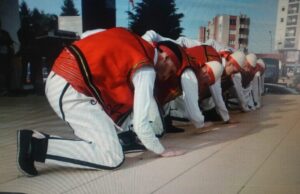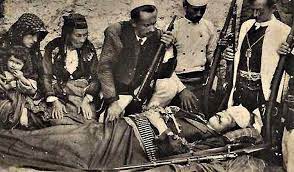Gjama e Burrave/Men’s Lament of Dukagjin is a very ancient death rite, handed down through generations, used to honor the name of the dead.
This death rite or custom in certain cases is also called vallja e vdekjes/dirge, whereby people circle around the man they have lost to honor him and swear to carry out his last wishes and virtues, or even to take revenge when he gave his life at war with the enemy.
In these provinces, gjama e vdekjes has also served to pass on the death news when no means of communication was in place.
According to research and folk stories, the rite or custom of Gjama e Burrave in Dukagjin originates from the time when Gjergj Kastrioti Skanderbeg – the Albanian leader, passed away. Prince Lekë Dukagjini with the other princes, out of grief for the death of the braveheart Gjergj Kastrioti, lamented loud out with shouting words, stroked their chests, pulled out their hair in deep sorrow, and bloodily scratched their faces.
This rite was enriched with a special choreography which in turn, has been passed down and enriched over generations. This old rite shows no violence or bloodiness.
The group of gjama performers needs a quorum of not less than 10 people, adult males, selected based on their vocals, as understood from the name “Gjamë burrash”. The larger the number of men taking part in the lamentation ceremony, the higher the respect for the deceased.
How is Gjama performed?
The first call mimics the sound of mountains when lightning strikes. The leader who leads the gjama bears responsibility for each detail. If the deceased is a male, gjama can be performed at any age. If the deceased is a female, gjama can be performed only once by her family’s side (family, tribe).
The text of gjama is summarized in a call by unifying voices, e.g. if it is meant for the nephew, the words are: O i mjeri nipi i jem! meaning Woe, my wretched nephew! If it is meant for the friend: O i mjeri miku i jem! meaning Woe, my wretched friend! and if it is meant for the neighbour: O i mjeri vllau i jem! meaning Woe, my wretched brother!
Each tribe or villager attending a death ceremony had the right to perform their gjama.
Gjama has also maintained the typical clothing. Guberja e zezë me tufa (a heavy knee-length black tasseled garb) was commonly used.
This rite became extinct after the ‘45s, strictly forbidden by the communist regime which dubbed it a backward custom, but the rite resumed its journey after the 90s to the present day.




